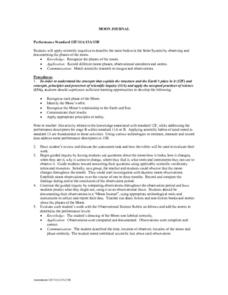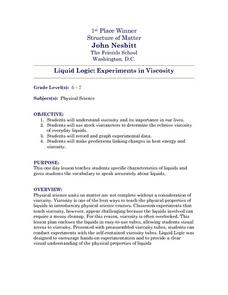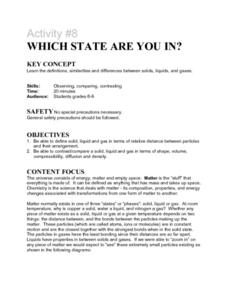Curated OER
Survival Science: How Evaporation and Condensation Can Save Your Life!
Eighth graders demonstrate how scientific principles can be used to provide resources in an emergency situation. In this evaporation instructional activity students view a demonstration on a solar still and see a brief PowerPoint...
Curated OER
Tet, the Vietnamese New Year
Students identify the similarities and differences between traditions in the Vietnamese New Year, TET, with the traditions of several holidays celebrated in America.
Curated OER
Specific Gravity-The Relative Density of Liquids
Students explore a hydrometer. In this gravity lesson students construct a hydrometer and create a liquid density column.
Curated OER
Wave Motion
Students observe and identify various waves. In this wave motion lesson, student use a Slinky, noise, people, and musical instruments to create waves and observe how each type of wave moves.
Curated OER
Dynamic River Model
Students develop the concepts of flood stage, levees, floodplain, and the dynamics of river flooding. They construct river models and test various flow rates and volumes. This lesson has an excellent experiment for students to do.
Curated OER
Moon Journal
Fourth graders observe Moon and its features, and record results both in written form and in a drawing on the given template.
Curated OER
Chemistry: States of Matter Quiz
In this chemistry worksheet, 11th graders take a states of matter quiz by matching 10 terms to their definitions, decide if 10 statements are true or false, and answer 2 fill in the blank questions.
Curated OER
Beach Erosion Investigation
Students determine the effects of gentle and strong waves on beach erosion. They use a stream table to simulate a beach and sketch the beach profile after simulated waves of different sizes.
Curated OER
"Julie of the Wolves"
Fifth graders research life in Alaska and compare life there to their lives in this lesson. They read "Julie of the Wolves." They research through the novel and other reference books facts about the Alaskan climate and geography. They...
Curated OER
Can You Control Floods
Students assume the role of an engineer or planner. As an engineer or planner they must come up with ideas that can be put into place to control floods. They produce a working model of flood control.
Curated OER
Cooling With Sunshades
Students conduct research in order to find the effects of properties exposed to heat and how they change temperature. They consider the effect of sunlight upon objects that are placed outside with the help of an experiment. They also...
Curated OER
Life Cycles of Mosses, Ferns, and Conifers
In this plant life cycle worksheet, students compare the life cycles of mosses, ferns, and conifers. This worksheet has 15 fill in the blank and 10 short answer questions.
Curated OER
Chemistry Lab: Solubility Product Constant of Sodium Chloride
In this solubility product constant of sodium chloride learning exercise, students gather the equipment needed and follow the procedures to determine the solubility product constant of a solute and demonstrate precipitation of a common...
Curated OER
Chemistry Practice
In this chemistry practice worksheet, students select the correct response to the given questions. Students apply knowledge about the states of matter, finding vapor pressure and atmospheric pressure.
Curated OER
I Need Room to Breathe
Seventh graders explore how exercise affects carbon dioxide levels in exhaled air.
Curated OER
The Same But Different
Fourth graders identify the characteristics of a simple physical change. They describe objects by the properties of the materials from which they are made. Students discuss the different states of matter and their distinct physical...
Curated OER
Pressure in Fluids
Students study the properties of fluids under different circumstances. In this pressure fluids lesson students view a demonstration, complete an activity and describe what they learned.
Curated OER
A Cloud In The Hand
Students investigate the scientific concept of forming clouds. The use simple materials to simulate the formation. This creates a powerful visual for students to make cognitive connections. They make observations and record them in a lab...
Curated OER
Secrets of the Ocean Realm - In the School "Star Gardens"
Students learn to use a tide table in plotting tidal curves and create a tide calendar by plotting a month-long tidal curve on an ordinary pictorial calendar.
Curated OER
Review for Thermodynamics Quiz
In this thermodynamics worksheet, students review kinetic and potential energy, enthalpy, entropy, and standard hear of formation. This worksheet has 1 short answer and 5 problem solving questions.
Curated OER
Creating a National Park
Students explore how national parks are created, operate and benefit society by creating a new national park for their state.
Curated OER
Liquid Logic: Experiments in Viscosity
Students examine specific characteristics of liquids through a hands-on lab activity. An experiment with teacher prepared viscosity tubes is conducted in which liquid identities are predicted based on data. A hypothesis is written to...
Curated OER
Activity #8 Which State Are You In?
Middle schoolers define, give similarites and differences between solids, liquids, and gases. They compare and contrast a solid, liquid and gas in terms of shape, volume, compressibility, diffusion and density. Pupils classigy common...
























